Introducing the Pride in Microbiology Network
Posted on August 24, 2023 by Microbiology Society
Pride in Microbiology is a new network of individuals within the microbiology community that is committed to creating a safe-space for Queer and Trans microbiologists to meet, network and collaborate.
Members Panel member, I’ah Donovan-Banfield, has interviewed the founders of the network to find out more. Landon Getz, Edel Pérez Lopez and Society Champion, Bruno Francesco Rodrigues de Oliveira share their experiences of navigating academia as members of the 2SLGBTQIA+ (two-spirit, lesbian, gay, bisexual, transgender, queer, intersex, asexual, plus) community, and give advice to others within the community who are also working in science.
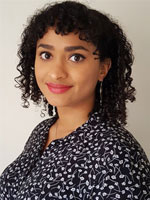
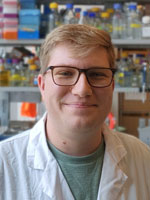
Could you all tell us a bit about yourself?
Landon Getz: I am a Postdoctoral Fellow at the University of Toronto, Canada, in the Department of Biochemistry. I am a bacterial geneticist, studying the interactions between phage and a marine foodborne pathogen, Vibrio parahaemolyticus. I completed my PhD in the laboratory of Dr Nikhil Thomas, at Dalhousie University, Canada, as a Vanier Scholar and Killam Laureate – where I studied the regulatory paradigm of Type III Secretion in the same organism. After finishing my PhD, I moved to Toronto, where I am now working with Dr Karen Maxwell, as a Postdoctoral Fellow. I am the inaugural recipient of the GSK Emerging and Pandemic Infections Consortium (EPIC) Convergence Postdoctoral Fellowship, and a Canadian Institutes of Health Research Fellow. Outside of academia, I am a staunch advocate for 2SLGBTQIA+ justice and belonging; I also have a keen interest in scientific ethics and policy.
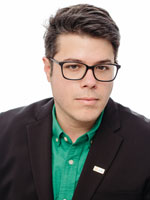
Edel Pérez Lopez: I am an Assistant Professor of Phytopathology, studying molecular mechanisms used by pathogens to affect susceptible crops, and insect vectors transmitting diseases. My research programme has been funded by several programmes, securing more than $4million in only three years. Throughout my career, I have published more than 70 peer-reviewed publications in journals focused on plant protection. Since 2020, I have been strongly implicated in advocating for 2SLGBTQIA+ rights and representation in plant and microbiology sciences, participating as a speaker in several events organised by diverse scientific societies.
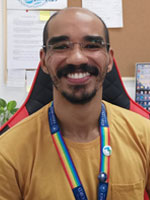
Bruno Francesco Rodrigues de Oliveira: I am an Assistant Professor of Bacteriology in the Department of Microbiology and Parasitology at the Fluminense Federal University, Brazil. As a marine bacteriologist, my main research areas of interest are primarily concentrated on the diversity and biotechnology of macroalgae microbiomes: the discovery, biochemistry and applications of marine microbial carbohydrate-active enzymes (CAZymes), and pangenomics of key marine bacterial models. In parallel with my academic duties, I have been a Champion of the Microbiology Society since 2020. One of my central roles as a Society Champion, was establishing, along with other fellow Champions and members, the ‘Queer in Microbiology’ group – which has been a pioneer in organising LGBTQ+ networking events and preparing equality, diversity and inclusion content to promote 2SLGBTQIA+ microbiologists, raising awareness on the challenges faced by them within their working environments.
What motivated you to create the Pride in Microbiology Network?
All: The 2SLGBTQIA+ community has historically been left out of justice and belonging conversations in both academic and industry spaces. Worse, it is not uncommon for 2SLGBTQIA+ scientists to go a significant portion of their career not knowing another 2SLGBTQIA+ scientist, let alone having a mentor that can help them navigate STEM spaces. The Pride in Microbiology Network hopes to bridge these gaps by building a community among 2SLGBTQIA+ microbiologists and creating opportunities for mentorship among senior and young members of this community in microbiology. Ultimately, it was the isolation that all 2SLGBTQIA+ scientists have felt at some stage in their careers, that motivated our creation of this network.
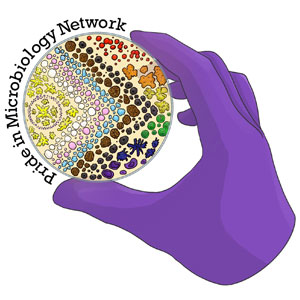
How can people join the network? Is membership also open to allies?
All: At present, the network is open to everyone who feels like it can be useful to them. We ask that allies recognise that the network is primarily for community building, networking and mentorship within the 2SLGBTQIA+ community, but hope that the network will evolve into a useful tool for allies. We are currently exploring the use of both an email list and a Discord server, both of which people can sign up to on our website.
Is there any advice that you would give to other queer people working in science?
Landon: The isolation experienced by 2SLGBTQIA+ scientists is real and made worse in more rural or smaller universities, research institutes, and STEM spaces. It is vital to remember that you are not alone and that there are many Queer and Trans scientists out there. Seek them out through whatever means necessary, and build a community that understands and accepts who you are. Building that ‘STEM family’ and support system is life-changing.
Edel: Another piece of advice is to ignore the ‘noise’. Do not try to know what others say or think about you. Coming from Cuba, it was common for people to use sexual orientation as a way to make others less valuable. For example, I experienced that within my own family. I have a cousin that is a brilliant surgeon and gay; my grandmother always said “he is brilliant but he has his ‘defect’”, referring to his sexual orientation. So, learn to identify who is giving constructive criticism and who is just trying to make you less valuable. I have no doubt that this phrase is now being used to talk about me, back in my country.
Bruno: One final piece of advice, is to keep a research network that supports you. Not only through active collaboration, but also ones that are committed to endorsing equity and diversity in an explicit way. This is decisive in the evolution of the academic careers of 2SLGBTQIA+ scientists, since they feel really integrated, not neglected or judged by what they are.
Do you have any role models and, if so, who?
Landon: I had the pleasure of meeting Dr Alexander Bond in 2019, when I attended and spoke at the 2019 LGBTSTEMinar, at the Institute of Physics, London, UK. Dr Bond is the co-founder of LGBTSTEM, which organised this event. Dr Bond’s advocacy has been a reassuring force in my STEM journey, continually reassuring me that STEM is not only a place I belong, but somewhere I can thrive. Through Dr Bond’s mentorship, I was successful in founding Queer Atlantic Canadian STEM, as well as the Pride in Microbiology Network – alongside incredible collaborators. I credit my current well-being in STEM in no small part to his mentorship, and role modelling.
Edel: In my case, my main role models have been successful female scientists like my first female supervisor, Dr Chrystel Olivier, from AAFC-Saskatoon, Canada. I met others in the 2SLGBTQIA+ community when I was a student in Cuba, but no one was open about it because of the discrimination that they could face. For me, women in STEM have experienced similar issues as the 2SLGBTQIA+ community, so I always admired those that had the strength to keep going and succeed in a straight-male-dominated environment.
Bruno: The first name that comes to my mind as a powerful role model is my former PhD and postdoctoral supervisor, Professor Marinella Laport, based in the Institute of Microbiology at the Federal University of Rio de Janeiro, Brazil. In addition to being an extraordinary researcher, Professor Laport has always been committed to keeping her group as diverse as possible. This makes all the difference in turning the working environment into a more comfortable and reassuring place for her mentees. Finally, I would happily add, as role models, my fellow colleagues from the Queer In Microbiology group: Daniel Gonçalves-Carneiro, I’ah Donovan-Banfield and Rebekah Penrice-Randal. Each one of them in their own particular way has inspired me through this journey. I could not have been luckier in having them during the creation and implementation of all the LGBTQ+ related initiatives at the Microbiology Society. Without them, there would not be a Pride in Microbiology Network.
Where can people keep up to date with what the Pride in Microbiology Network does next?
All: We encourage people to get connected with us through our Twitter and Instagram accounts, Discord (for now – we are looking for a better way to keep in contact with the community), and our webpage.
The Pride in Microbiology Network is a community-building and mentorship initiative which we hope will build organically around the 2SLGBTQIA+ community in microbiology. Get in touch and help us build this thing!
The Microbiology Society is keen to continue our work within the development and support of historically marginalised communities, promoting equality, diversity and inclusion. We encourage you to come forward and take up the opportunity to organise your own events and activities – to contribute to recognising and highlighting the voices within our community, which in return will pave the way for us to support microbiology into the future.
To get involved with Society activities and host your own event, contact [email protected].
